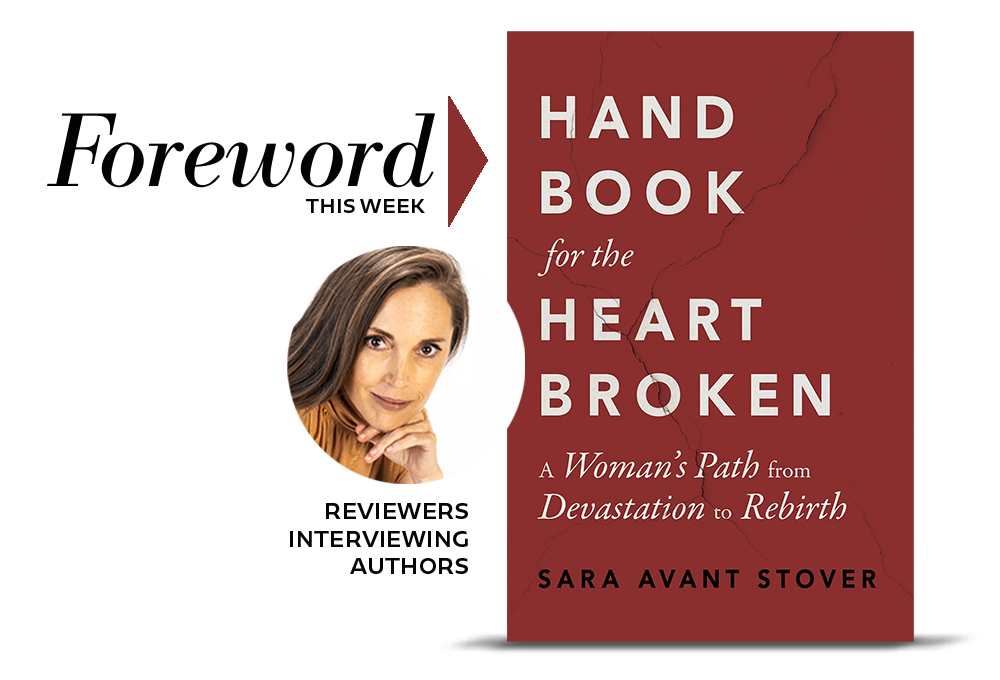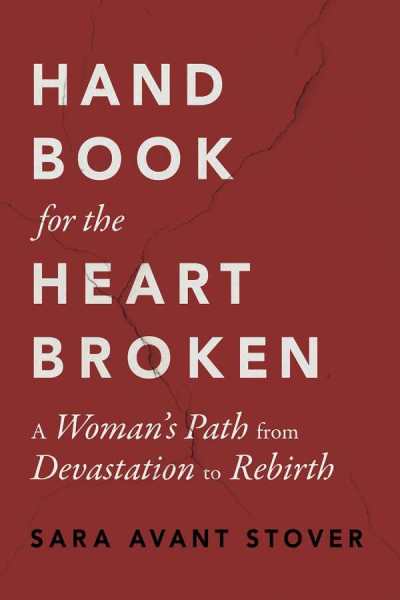Breaking the Lock of Heartbreak with Sara Avant Stover, Author of Handbook for the Heartbroken

“You have to feel it to heal it. Heartbreak is here to help you evolve. You have what it takes to face this and you will be proud of who you become as a result of doing that.’’ —Sara Avant Stover
We got to thinking about heartbreak this week for obvious reasons. What is it exactly that makes the end of a once-loving relationship so devastating? We were shocked to learn that breaking up is perhaps the greatest risk factor for first-time suicide attempts according to studies—and yet all anyone seemingly wants to talk about is love, love, love. It’s enough to make you gag because, as Helen Fisher reminds us, “almost nobody gets out of love alive.”
With heartbreak on our mind, we came across a few thoughtful observations on the condition, starting with Rachel Cusk in her divorce memoir Aftermath: “Grief is not love but it is like love. This is romance’s estranged cousin, a cruel character, all sleeplessness and adrenaline unsweetened by hope.”
And then this one that jumped off the page while we were reading Charles Frazier’s Thirteen Moons: “When all else is lost and gone forever, there is yearning. One of the few welcome lessons age teaches is that only desire trumps time.”
And here’s Florence Williams in Heartbreak: A Personal and Scientific Journey to clarify what love is: “Basically … a strong emotion attached to memories.”

The mention of memory brings us back to Helen Fisher and a paper she did for the Journal of Neurophysiology. While studying fifteen people who hadn’t recovered from their breakups, she learned that they spent more than 85 percent of their waking hours thinking about the lover who rejected them.
“One of the most painful experiences that a human being can suffer is to lose a life partner,” she says. “I think nature has overdone it.”
Kristine Morris’s review in Foreword’s May/June issue tipped us off to Handbook for the Heartbroken. In today’s interview, you’ll see that Sara Avant Stover has given heartbreak its due.
Your book brings a strong message that it’s possible not only to survive heartbreak, but to allow it to transform us into more mature, self-aware, and authentic people living deeper, richer lives. What does this transformation look like in your life? How are you different from the person you were before your own experience of heartbreak?
I’m a very different person on this side of heartbreak than I was before. Inside, I now feel a deep wholeness, at-homeness, self-love, and acceptance of life as it is. I also have a much greater capacity to be with the full spectrum of my humanity—the joy and the sorrow, the dark and the light—and I have a stronger capacity to be with others when they’re struggling.
There are no unexplored corners in my psyche and I am free of shame and secrets. Externally, I’ve built my life on a much more solid foundation—which includes a stable and sustainable business and finances. I’ve also ensured that my closest relationships with my friends and family are able to weather authenticity and the ups and downs of life. Last, but not least, I’m engaged to an amazing man who’s deeply trustworthy and honoring of me and our relationship. In short, my life is incredibly beautiful! And it’s my heartbreaks and how I fully faced them that allowed for all of this.
What does it mean to really heal from heartbreak, and why do we often find it so difficult?
To really heal from heartbreak, we need to fully meet ourselves as we are. This means feeling all of our feelings: grief, anger, despair, depression, confusion, all of it! This is difficult because we’re not taught how to feel. Rather, we’re conditioned to believe that hard emotions will tear us apart when, in fact, the exact opposite is true. The big emotions that come with heartbreak, especially grief, are what will transform us. They’re the engine of change that will lead us to the shores of our new lives if we open to them and allow them to do so.
You’ve described American culture as “heartbreak illiterate.” We don’t know what to say to a heartbroken person or how to offer our support. Some of us can feel so inept in the face of another’s pain that we may even avoid the heartbroken one, who then suffers in isolation. What is there about American culture that fosters such behaviors, and what can we do to better support those we care about?
Death, grief, loss, and failure are kept on the outskirts of our society. We live in such a rugged, individualistic culture, one that’s oriented toward success at all costs and holds to the view that anything other than that is an enemy. We internalize these beliefs and then push away our own hardships and those of others. All of this aversion is simply a social control mechanism to keep people working toward a false ideal. When we’re willing to step outside of this false paradigm, we can see that the real path to success and fulfillment includes failures, challenges, and setbacks. Success and failure, joy and sorrow, grief and love—these are two sides of the same coin.
You wrote that your book was designed for women, but that men would also find it helpful. Why did you decide to focus on women? Do you find that men and women have different responses to heartbreak and may require different types of support?
Anyone who needs support with heartbreak is welcome to read this book and will gain value from it. I wrote this book specifically for women because I’ve been working solely with women for the past two decades. This is my passion and purpose, as I’ve been a feminist since birth! I grew up with three sisters and went to an all-women’s Ivy League college in New York City. Also, all of the heartbreaks I share in the book stem from larger cultural wounds of the patriarchy. Most women suffer from these in isolation and secrecy (ie, healing after abortion). I want to set a new precedent in dealing with heartbreak—that we need one another to heal.
What did you find most helpful when you were going through heartbreak? What was most unhelpful?
I found it helpful to imagine I had two broken legs that needed extensive rehabilitation. We often don’t see our own emotional wounds, and this can make it challenging to take the space we need to truly heal. Shifting my expectations and not trying to hurry my process helped me to have the full experience of transformation that’s available to all of us in heartbreak. It was unhelpful when other people judged me for not recovering more quickly, and when I didn’t have the social and financial resources and support in all the ways I needed during those years.
A deeply heartbroken person may at first rebuff those who try to help. What have you found most effective in getting a heartbroken loved one to accept our love, care, encouragement, and support?
Instead of trying to help someone, we can hold the intention to simply be the presence of love when we’re with them. If they need space, give them space. Let them know, gently, that you’re here for them. Reach out on occasion and offer them tangible forms of support like inviting them over for dinner, coming over to sit with them, or getting them a gift certificate for a massage. Be patient and don’t give up on them.
Why might the all-too-common advice to “just get over it,” or comments that imply that a loss like that of a pet doesn’t merit so much grief, be damaging rather than helpful? What are some of the effects you’ve seen when people try to implement such advice?
When we try to hurry up and get over it and don’t take the time we need to feel our grief, anger, and despair, we’re not surrendering to and partnering with the transformational medicine that’s available in heartbreak. Without feeling those feelings we get stuck in various ways, and when that happens we’re not going to open to the new possibilities that rebirth brings.
Your book makes the important observation that no matter how overwhelming and painful heartbreak is, it is only a part of us, and that other parts of us can be powerful allies in our healing. Please give some examples of how you’ve seen this play out in your experiences and/or those of your clients.
At the core of all of us is our essential Self. All spiritual traditions point to this, and it’s the part of us that is more “spirit” than “human.” We’ve all tasted this—maybe on a hike in nature when we’re with someone we love, or during a poignant life experience like a death or a birth. This Self can never be damaged or destroyed. Heartbreak may eclipse it, like clouds at times cover the sun, but the sun is always there. When we feel out of touch with our essence, it’s helpful to remember this truth and hold the intention for our Self to guide us through the dark valley we’re navigating.
What are the signs that we may still be dealing with unresolved heartbreak from years or decades ago, and what are the signs that healing has taken place?
Signs of unresolved heartbreak are that you still feel anger, resentment, shame, bitterness, regret, or sadness about the experience. You will also notice areas of your life that feel stuck and aren’t working—whether that’s in your health, intimate relationships, finances, or career.
You know that healing has taken place when you feel a sense of completeness around what you’ve experienced. While you may always feel a hole inside around that particular loss, you’re expanding and becoming more whole around it. You’re able to make meaning out of what happened, and you feel grateful for who you’ve become as a result of it.
What do you find to be the biggest obstacles to healing from heartbreak? What are some of the best resources to help overcome these?
The biggest obstacles to healing from heartbreak are not being willing to feel the feelings that come with it, not taking the time needed to heal, and not having the support from community that will help us to do this. I created this book to be a resource to help overcome all of these! I also recommend attending community grief rituals if they’re available in your area and exploring Internal Family Systems (IFS), the cutting-edge psycho-spiritual model that I weave throughout this book and that played a significant role in my healing.
What message are you most eager for readers to get from your book?
You have to feel it to heal it. Heartbreak is here to help you evolve. You have what it takes to face this and you will be proud of who you become as a result of doing that.
Are you working on another book? If so, please tell us something about it, and if not, what does your next project look like?
I’m not working on another book yet. Right now I’m expanding my offerings of in-person retreats and online programs. All of these support women in transforming their challenges and stepping more fully into who they truly are.
Kristine Morris
